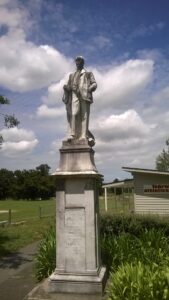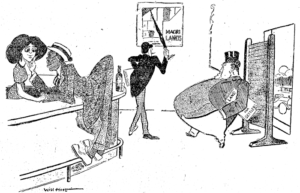1913: Maori Man Applies to be Europeanised
March 4, 2022
By AHNZ

Today in New Zealand history, 4 March, 1913, the 25 year old Rangi Kerehema said he didn’t want to be a Maori any more. Rangi applied to the Earl of Liverpool, the last man to hold the office of Governor of New Zealand, to declare him a European.
The possibility of such a thing had been opened up by William Herries’ (image left,) Minister of the new William Massey Ministry. As with all new Governments, the primary goal was to break up the structures feeding into the old regime and replace them with structured aligned to the new Boss. The new Reform Government had some drastic work to do in this area since the last time there had been a new Government was 25 years before! Herries, as Native Minister, created a law called the Native Land Amendment Act.
Herries’ Law dislodged great sections of New Zealand country for improvement, freeing many hectares from the Stygian grip of old red tape supposedly put there to “protect” Maoris from their own backwardness. Indeed, Maoris were “disabled.” It became possible to deal with individuals rather than the groups the previous government, The Liberals, had enthroned. It became easier to convert Maori Leasehold Land to private land. You can be quite rest assured that Reform’s reform also created an avalanche of tax revenue pouring into the new Executive Government’s coffers. Massey’s lieutenant had served his party well.
“In the election of 1912 the Liberals were finally kicked out after 22 years and ‘farmer’ William Massey became the new Prime Minister.” – 1913: The Great Strike Boogaloo, AHNZ
“Herries had an extreme ‘use it or lose it’ approach to Maori land…his 1913 Native Land Amendment Act was designed to enable quicker alienation…it facilitated the transfer of vested Maori leasehold lands to the (generally pakeha) tenants. The ‘protection’ afforded by vesting land in the boards, then, turned out to be ‘only marginally better than none at all’, and a third of the leasehold acreage was permanently alienated well within two decades. Other patrimonial ‘safeguards’ were also removed. In particular, the necessity for the Crown to purchase through ‘resolution of assembled owners’ and Maori Land Boards was rescinded. Although on the surface such moves gave greater autonomy to collectives, it was also easier for Crown agents to buy interests in land from individuals, often clandestinely, following this up by securing Native Land Court intervention to gain usable and saleable blocks.” – State Authority, Indigenous Autonomy: Crown-Maori Relations in New Zealand/Aotearoa 1900-1950. Richard Hill (2004); New Zealand Electronic Text Collection
 One particular part of Herries Act was S171 caused a great stir. It was the idea that the Governor, by order-in-council, could convert a Maori citizen into a European citizen. This would lift the fetters on the Maori Zelandian and give him the full rights and responsibilities of an Anglo Zelandian, including the responsibility to pay rates taxation. If he were considered educated enough, independent enough, and wealthy enough, then the Maori could join civilisation.
One particular part of Herries Act was S171 caused a great stir. It was the idea that the Governor, by order-in-council, could convert a Maori citizen into a European citizen. This would lift the fetters on the Maori Zelandian and give him the full rights and responsibilities of an Anglo Zelandian, including the responsibility to pay rates taxation. If he were considered educated enough, independent enough, and wealthy enough, then the Maori could join civilisation.
New Zealand Truth mocked the new law with a cartoon in that same year, 1913: While the suited Maori landowner sidles up to a white woman at the land office fat-cat land gobblers pour over the maps for land to inhale!
The law is a reminder that we have never been ‘One People’ but two. This was understood perfectly well as recently as 1974 during Prime Minister Kirk’s ‘Great Migration’ address. In 1913 this country was thinking again, as would again, about the costs and benefits of letting Maoris migrate to New Zealand. For example, the assembled tribes of Wanganui, Waikato, and King Country held a great conference in 1913 to consider the question of Europeanising Maoris2.
In my opinion, the Europeanisation bit was Herries’ Red Herring. A politician’s distraction often involves a radical prod at the social fabric to distract the chattering classes while the real work is done behind the smoke screen. The real work was land reform which might have been resisted if not delivered with a conspicuous side-order of race politics.
Rangi Kerehema became a European and served as Herres’ test case and distraction. However, by 1918 he was complaining in court of having been unfairly used by the same government. Apparently Rangi never wanted to be a European after all in the first place. Since becoming so, a bureaucrat of the Reform Government had secured Power of Attorney over his estate in a massive conflict of interest for a public servant. Rangi wrote blank cheques for his minder to sign and had land sold out from under him at under value. Just as the official inquiry into all of this was gaining pace the politician who instigated it all, John Hornsby (Liberal) withdrew his interest and the entire thing vanished with another puff of smoke!3
I can find no trace of what happened to the wealthy young Kerehema after that. It would be interesting to see if the Member for Wairarapa, Hornsby, received an expensive bouquet of flowers and a fat “thank you” card for backing off. Seems that our dirty politicians had done their usual dirty work once again. This is a story from 100 years ago but it’s all the same. We don’t learn from past mistakes and keep holding elections and voting them in again.
—
1 However, I cannot see this provision in this or any other section having read the Act online. Perhaps the online copy is a later version
2 Ref. Korero at Taumarunui, Auckland Star; Papers Past
3 Ref. A MAORI’S ESTATE, AFFAIRS OF RANGI KEREHOMA, Evening Post (1918,) Papers Past
Image ref. William Herres statue, Te Aroha. AHNZ Archives (2016)
Image ref. ‘Europeanising the Maori ~Reform’ s Possibilities’; NZ Truth (1913,) Papers Past
 Like Comment Share
Like Comment Share





